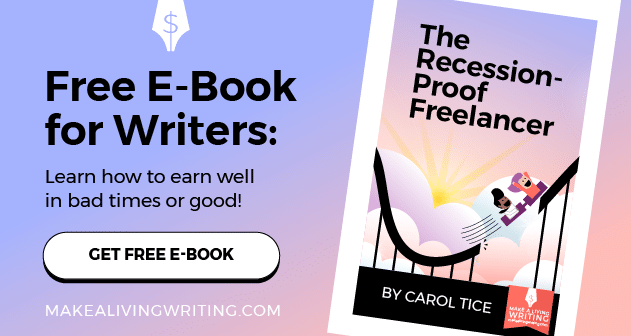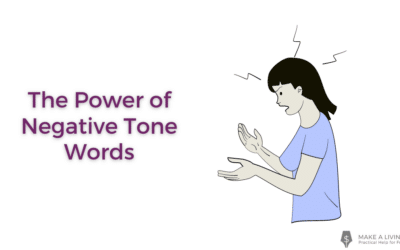Feeling like your writing ideas tank is empty?
It usually looks something like this…
You’re staring at a blank screen trying to come up with a blog post idea or story idea.
You’ve spent the better part of a day typing a few lines, then deleting them.
And it seems like there’s a sinister voice inside your head mocking every attempt you make.
“You don’t have any good writing ideas. Why bother?”
Followed by maniacal laughter, of course. Bawhahahaha!
If you’re struggling to come up with writing ideas, you’re not alone. It happens. But that void in your brain doesn’t have to stay empty for long.
There’s just no reason to be wasting days, weeks, months or even years thinking: I don’t have any good writing ideas to make money.
The truth is…there’s an unlimited supply of writing ideas out there in every niche, and for every type of client, magazine, or business. You just need to know where to find them.
Ready to brainstorm some writing ideas? Check out these hacks to fill your tank.
Before you start churning out writing ideas…
You’ve got to have a way to save them.
Why? There’s so many ideas out there, you can’t possibly remember them all if you’re relying on memory.
So before you get started, find a way that works for you to record writing ideas like:
- Notebook
- Productivity apps (I use Samsung Notes. But there are many others)
- Google Doc
- Microsoft Word doc
- Notecards
I’ve actually used all of these at some point in time. And they all work. Pick one.
You just need an easy way to save your writing ideas with a few notes, links, sources, maybe a brief outline. Then when you go back, you’ve got everything you need without starting from scratch.
Fun fact: Sometimes Carol Tice puts a blog post on the Make a Living Writing calendar months into the future. Types a few notes. Writes a working headline. And forgets about it. But when that blog post finally comes up, those notes make it easy to remember the idea and write the post.
OK. Ready to start brainstorming some writing ideas?
1. Watch national news
Sure…right now you’re going to get an earful about protests in metropolitan cities, the upcoming presidential election, and COVID-19.
But that’s not exactly what you’re looking for. It’s the writing ideas you can pull out of those news stories, like:
- What tech tools are law enforcement agencies using to stay connected?
- What are the alternatives to tear gas for crowd control?
- How has live streaming changed the landscape for traditional journalism?
- Is COVID-19 spreading in your area because of protests and large gatherings?
- What the long-term impact of online school for parents, teachers, and kids?
See. Five story ideas in the first five minutes of the broadcast. Easy-peasy. And the broadcast hasn’t even hit business, sports, health, the environment, or human interest stories yet.
The trick is being able to train your brain to ask questions, look for missing pieces, find a new angle, or advance a story into the future. You can literally do this with anything.
Tip: Try this in reverse. Watch local news and ask yourself if the “stories of the day” represent national trends you could turn into story ideas.
2. Read niche pubs
If you’ve fallen into the trap of trying to be a generalist as a freelancer, NOW is always the best time to change that.
Picking a niche helps you narrow your marketing efforts, target specific clients, and be in the know about trends and issues in your niche.
And reading niche pubs and websites makes it easier to find writing ideas. (FYI…being a niche writer can help you make more money, too.)
Did you know there’s a niche pub for just about every industry you can think of?
Go ahead. Google it.
“Niche + magazine”
I picked some random niches, and found niche magazines for:
- Tow truck driving
- Software development
- Non-profits
- Home-schooling
- Nursing
- Law enforcement
- Gyms and health clubs
- Basket weaving (yep, there’s even a niche pub for this)
There’s literally a niche magazine or website for just about anything.
So how do you come up with writing ideas from a niche pub or site?
When you get familiar with your niche, it’s easier to think about questions, ideas, or missing pieces in a feature, trend or news story. Just ask yourself some questions like:
- What happens next?
- What are they doing now?
- Is anyone else doing something like this?
- What’s that person’s backstory?
- Is this just a trend or a fad?
Tip: You can also get great writing ideas by studying the ads in a niche pub or on a niche website.
3. Use social media/online groups
Every day you probably get invited to join a private group on Facebook or LinkedIn related to your niche.
IMO…you should selectively join a few of those, pay attention to the conversation, and participate.
Why? It’s a gold mine for writing ideas you can turn into a pitch, a blog post, or content marketing piece. And it helps you cultivate sources.
It’s kind of like the modern version of being a beat reporter in the days of old-school journalism.
- You find out what people in your niche are talking about
- You’ll learn about niche trends and issues
- And when you take a little time to get to know people in the group, they’ll come to you with writing ideas
For example: Many of the blog posts we’ve published here have come from conversations that started in the Freelance Writers Den.
4. Search Quora and Reddit
You’ve got questions…Quora and Reddit have answers to help you come up with writing ideas.
Both of these Q&A-style sites are great resources to help freelancers.
It’s like a worldwide consciousness chattering about everything you can possibly think of.
- Quora users = 300 million
- Reddit users = 330 million
Sure. There’s some useless drivel, gossip, and rants on Quora and Reddit. (It’s one reason some people avoid these sites).
But if you can look past that, Quora and Reddit can be an excellent place to get writing ideas, find fresh angles, and even connect with potential sources. Try this:
- Pick a topic you’re interested in writing about
- Type a key phrase in the search bar on Quora or Reddit
- Press Enter, and voila..tons of results you can turn into writing ideas
Think of Quora and Reddit as a starting place to help you generate writing ideas.
5. Listen to podcasts/radio
Here an example:
I used to listen to a local radio news show when I had a day job and a 30-minute commute.
Every morning, the radio hosts spent a couple minutes talking about new research and studies related to health (which happens to be my niche). It was usually just a sound-bite of information.
But I’d take note of the story and get enough details down to remember it. Later, I’d look up the study, get more information, and turn it into a story for an employee wellness newsletter, a blog post, or to pitch an idea to a client.
More radio shows operate like podcasts now, so you can listen to past shows anytime. (Just keep in mind, you’re not listening to practice your karaoke skills. You’re listening for writing ideas.)
Podcasts may be an even greater source for writing ideas, because you can pick your niche.
Hosts frequently interview leaders in their niche, talk about trends and issues, and answer questions from listeners.
You can even grab lots of useful links and resources for writing ideas from the shownotes of a podcast.
6. Study conference agendas
It’s no secret COVID-19 has turned the in-person conference world upside down.
Sure, some writing conferences have canceled. And some have postponed their next event until 2021. But other conferences made the switch to online events.
Either way, conferences can still be a great place to generate writing ideas…and YOU DON’T EVEN HAVE TO GO.
Grab a conference agenda online and take a closer look at the topics, speakers, and keynote address.
That’s a great starting point to generate writing ideas you can develop, pitch, and turn into paid assignments.
7. Read press releases
Here’s another great way to come up with writing ideas…read press releases.
For example: Carol Tice took a few minutes to sift through press releases flooding her inbox. And in just a few minutes, she generated 23 salable article ideas.
You can do this, too. If you get niche-related press releases via email, take a minute to read them. A quick scan can usually identify key sources, trends, and issues, and spark ideas for a story or blog post.
If you don’t see a lot of press releases via email (you’re lucky…LOL), go to a press release distribution site like PRNewswire and search for a key phrase in your niche.
Chances are pretty good, you’ll turn up press releases about products, services, and events in your niche, with lots of detail you can use to generate more writing ideas.
Tip: Check your spam folder or junk mail folder for press releases your email service provider may have bumped.
8. Use Google Alerts
It’s really simple.
Tell Google you’re interested in “key phrase.” Pick something in your niche.
Set some parameters about getting Google Alert updates (as it happens, daily, weekly).
Then do nothing. Seriously, it’s that easy.
While you’re busy working on other assignments, or taking nap, the world’s favorite search engine monitors the web for your “key phrase.” Then sends you an email with links, sources, and stories.
It’s a great resource to help you generate writing ideas, and saves you time.
9. Eavesdrop on conversations
I know. It probably violates social etiquette laws. But it’s been a pass time of mine for as long as I can remember. It’s one reason journalism was a good fit for me.
It’s harder to do this in the COVID-19 climate, because we’re not out and about like we used to be. But it still works.
The next time you’re at the store, at an event, in a restaurant, waiting in line…listen in on the conversations around you. I’ve listened in on conversations about:
- Parenting
- Dating and relationships
- Dealing with a bad boss
- Customer service
- Travel and vacation planning
- Home improvement projects
- Fad diets and workouts
- Medical procedures
- Crimes
- Insurance claims, and more
One of my personal favorites from a lifetime of eavesdropping…
I’m riding on a city bus in Spokane, Wash. There’s a shady character in the back seat. Another shady character gets on the bus. The two start chatting, and realize they were in state prison together a few years ago. They even knew the same code to get extra privileges from a friendly warden, and swapped stories about which prison meals were best.
There’s potential for all kinds of stories there. A feature on the state correction center, the “friendly” warden, or the prison cafeteria. Or maybe a bigger piece on recidivism, and programs and services available to help people like these guys get back on their feet.
What have you overheard recently that could spark a writing idea?
Never run out of writing ideas
One of your most valuable skills as a freelance writer is your ability to generate writing ideas. And they’re everywhere. Look around. Pay attention. Maybe even eavesdrop. The more ideas you pitch to editors and marketing managers, the more assignments you’ll land, and the more money you’ll make.
How do you brainstorm writing ideas? Let’s discuss in the comments.
Evan Jensen is the blog editor for Make a Living Writing. When he’s not on a writing deadline or catching up on emails, he’s training to run another 100-mile ultra-marathon.












